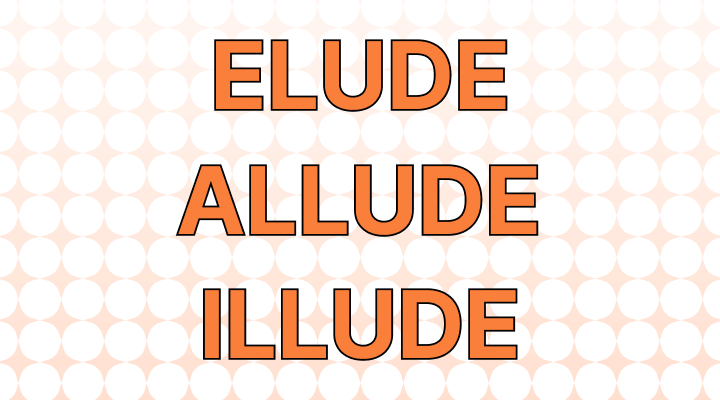The three words have completely different meanings. "Elude" means to evade or fail to be grasped or attained. "Allude" means to indirectly suggest or reference. "Illude" means to trick or deceive.
An example of eluding something would be a criminal eluding the police, which means the criminal is not caught by the police. A mink can elude capture by a hunter, meaning it evades getting caught.
An example of when "elude" means failing to be grasped or attained, would be when a gold medal eludes an athlete, which means the athlete is not successful in receiving the gold medal. The logic of an idea may elude people, which means they fail to understand it. When sleep eludes someone, they are unable to successfully fall asleep. This can also apply to memory: If a piece of information eludes you, that means you cannot remember or recall it.
Alluding is common in literary works and art. A piece of art may allude to the Renaissance, and a novel can allude to Shakespeare's works. Alluding, however, does not always apply to the arts. A comment can allude to an earlier discussion, which means it refers back to a previous conversation.
"Illude" is an older word that is not as commonly used in recent times and may be considered obsolete. The word means to trick or deceive. A scammer can illude gullible people into sending him money, which means he is tricking them to give him money.
Example sentences
Elude:
- The clever criminal managed to elude the cops by disappearing into the crowded streets.
- Despite hours of searching, the solution to the puzzle continued to elude them.
- Her memory of that day began to elude her as the years went by.
- The intricate code proved to be a challenge, but he was determined not to let it elude him.
- The wild animal managed to elude capture once again, leaving the researcher frustrated.
Allude:
- During his speech, the professor subtly alluded to the theories of a famous philosopher.
- Her story contained hints that seemed to allude to a hidden truth.
- The painting's title seemed to allude to the artist's personal experiences.
- The comedian's jokes alluded to current events in a humorous way.
- The book's author often used metaphors to allude to deeper philosophical concepts.
Illude:
- The con artist used clever tactics to illude his victims into believing his false promises.
- The magician's performance was meant to illude the audience into thinking the impossible had happened.
- The illusionist's tricks were so convincing that they illuded even the most skeptical observers.
- The salesperson's deceptive techniques were designed to illude customers into making impulsive purchases.
- His charming words were carefully crafted to illude anyone who crossed his path.
Want to sound like a native speaker?
Engram’s AI-powered grammar checker makes your English sound like a native speaker’s, suggesting natural English expressions on top of fixing grammar, spelling, punctuation, word order, and vocabulary.

Reference:

















